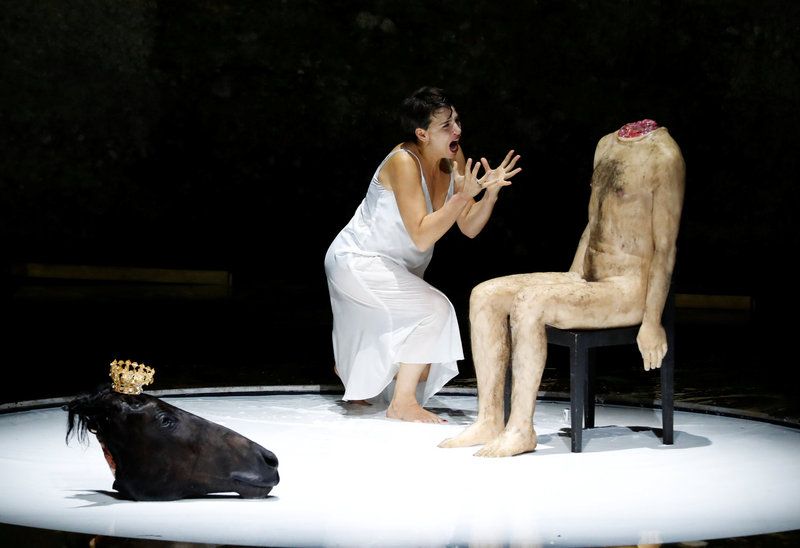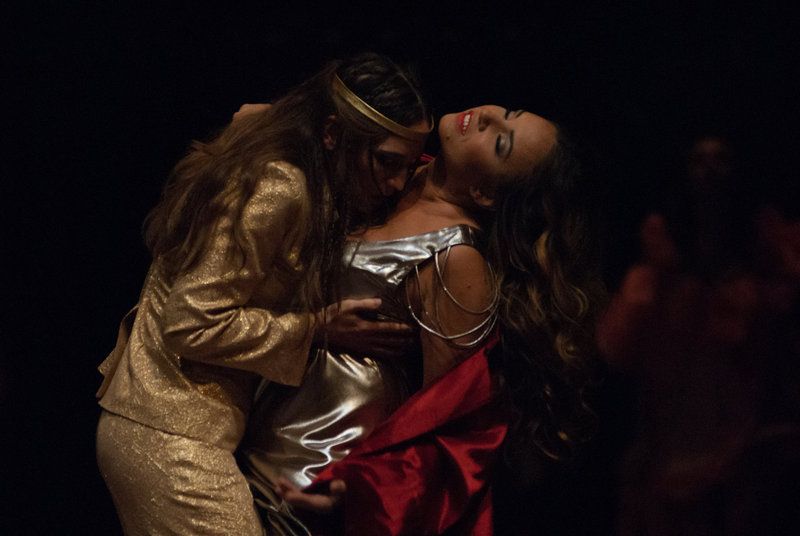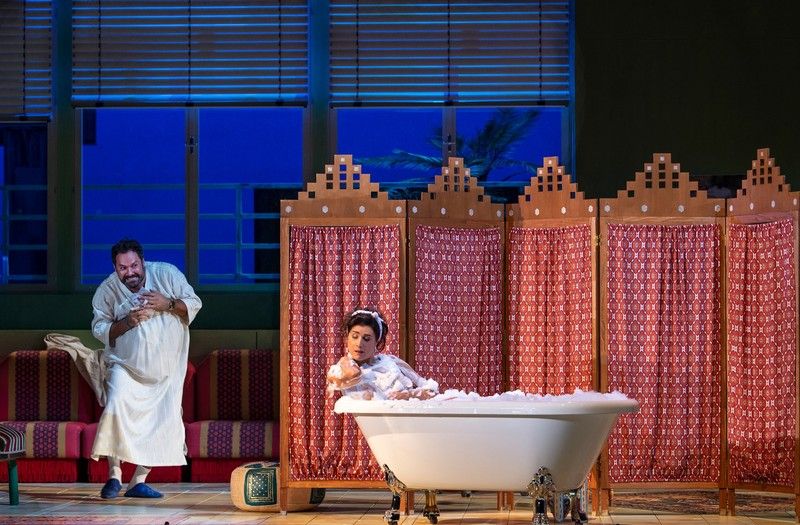
Image
Asmik Grigorian as Salome in Romeo Castellucci’s enigmatic, Jungian production.CreditLeonhard Foeger/Reuters

Image
Kate Lindsey (Nerone) and Sonya Yoncheva (Poppea) as scheming rulers in “L’Incoronazione di Poppea” at the Salzburg Festival.CreditMaarten Vanden Abeele/Salzburger Festspiele

Image
Ildar Abdrazakov (Mustafà) and Cecilia Bartoli (Isabella) in the comic, surprisingly resonant “L’Italiana in Algeri” production.CreditRuth Walz/Salzburger Festspiel
At Salzburg, an Unlikely Operatic Trio of Women Finding Their Way
By Anthony Tommasini
Aug. 17, 2018
SALZBURG, Austria — Opera, again and again, shows us women trying to find their way in a world dominated by men. Do they connive a path to power? Do they self-destruct? Do they use their wiles to wink past those who try to stymie them? These were three courses of action presented by the Salzburg Festival here, in Monteverdi’s “L’Incoronazione di Poppea,” Strauss’s “Salome” and Rossini’s “L’Italiana in Algeri.”
Monteverdi’s Poppea, a fiercely ambitious Roman noblewoman, uses sexual allure and ruthless power plays to become empress. With the soprano Sonya Yoncheva dramatically ferocious and vocally sensual in the role, the character came across, in this #MeToo moment, as strangely more sympathetic than in the past. After all, if a woman in her time wanted real political power, what other course did she have? Even the more extreme Salome, in Asmik Grigorian’s intense performance, came across as a woman coolly exploring the reach of her power in a rigidly patriarchal society.
Indeed, coolness was emphasized in Romeo Castellucci’s production, fixated on exploring the opera’s Jungian undercurrents, even if that resulted in some baffling stage imagery. At one point we see Salome sitting like a little girl in a pool of milk, washing her arms and legs. To attain purity? As a gesture of bitter irony? At the end of the opera, Salome stands in that same pool in sickening triumph, holding the head not of Jochanaan (John the Baptist, here the strong bass-baritone Gabor Bretz) but of a horse. Don’t ask me why.
John Daszak and Asmik Grigorian - Strauss: SalomeCreditVideo by medici.tv
Poppea and Salome may have come across with new nuances these days, but the sassy young Isabella of “L’Italiana in Algeri” surprised me by perhaps having the most to say to our current moment. The role is sung to perfection by Cecilia Bartoli in a staging that draws out surprising contemporary resonances from this 1813 comedy.
When we meet her, Isabella has come from Italy looking for her boyfriend, Lindoro, who may (or may not) have come to grief in Algiers. Most productions milk the tale for its clash-of-cultures farce. But this daffy staging by Moshe Leiser and Patrice Caurier, with colorful sets suggesting modern-day Algiers, finds amusing commonalities between the male-dominated Muslim and male-dominated Italian worlds. The conductor Jean-Christophe Spinosi, showing sensitivity to the intricacies and sparkle of Rossini’s score, led the excellent Ensemble Matheus in a beguiling performance.
Ms. Bartoli’s Isabella is a clever, independent woman with an adventurous streak. She appreciates men, savors romance and seems committed to her missing boyfriend (sung by Edgardo Rocha, a splendid young tenor). Manipulating male authority figures who have sex on their minds is just something she’s forced to do. (Poppea and Salome, you felt watching Ms. Bartoli, would understand.) And if putting absurdly puffed-up men in their place involves leading them on, well, at least Isabella has some fun with it and teaches them a lesson.
The story is driven by the marital crisis of Mustafà, the bey of Algiers (here the bass Ildar Abdrazakov, whose tall, stocky frame is fleshed out with a padded belly that makes him look like an Algerian Tony Soprano). Feeling that his sex life with his wife (the wonderful soprano Rebeca Olvera) needs a jolt, Mustafà orders his fixer to find him a feisty Italian girl.
A shipwreck brings some Italians to shore — including Isabella, who arrives on a camel. In the showpiece aria that follows, “Cruda sorte,” she bemoans her fate. All she wants is to find her lost lover and go home. Yet the way Ms. Bartoli shapes the supple phrases and dispatches the dazzling coloratura roulades, combined with the gleam in her observant eyes, suggests that Isabella will soon figure out how to handle the situation. Sure enough, once she notices how much attention her looks are attracting from the Algerian men, Ms. Bartoli’s Isabella smiles knowingly. Ah, they’re just like Italian men, she seems to be thinking. No problem.
Still, even though this is manifestly a comedy, it was a little disconcerting to watch in 2018. Isabella can handle herself and defuse male threats easily. But I was newly aware that she might have a sister, or female friends back home, who couldn’t.
Part of that sisterhood is a character I would never have thought to pair with Isabella: Salome. Mr. Castellucci’s surreal production made Salome’s weird fascination with Jochanaan seem, for once, psychologically plausible. In a world driven by domineering men (including God, the ultimate male authority figure for Salome), Jochanaan is not out for himself. Salome needs to figure out why. Ms. Grigorian sang Salome with a plaintive radiance that few sopranos summon. The conductor Franz Welser-Möst drew out every lushly lyrical strand of Strauss’s teeming and volatile score, played brilliantly by the Vienna Philharmonic.
In Mr. Castellucci’s boldest touch, Salome does not perform her famous Dance of the Seven Veils for her leering stepfather, King Herod (John Daszak). Instead, Ms. Grigorian, alone on stage and nearly naked, is tied by ropes to a stone platform for the entire 10-minute sequence. I’ve never seen a more mesmerizing rendering.
Aspects of Salzburg’s “Poppea” also touched on themes of power, ambition and sexism. But the frustrating production — designed, directed and choreographed by the artist Jan Lauwers — essentially turned the opera into a dance piece. Though the gifted young dancers created some magical sequences, during whole stretches crucial interactions between the singers in the cast got lost amid nonstop, often frenetic movement. Worst of all, throughout the opera — three hours of music — a tag team of dancers took turns spinning continually in place atop a round platform at the center of the stage. If the goal was to entrance the audience, it didn’t work. I found it annoying and pretentious.
Musically the performance was excellent, with William Christie presiding over his superb ensemble Les Arts Florissants. The dark-voiced mezzo-soprano Kate Lindsey made a hotheaded, kinky and smitten Emperor Nero.
Monteverdi’s achievement is to show Poppea and Nero as uncontrollably drawn to each other. He wants us to be at once beguiled and repelled by them. In Nero’s scenes with Poppea here, you could see the couple engaged in a childlike game of seduction and power. That game seemed all too familiar right now.
https://www.nytimes.com/2018/08/17/arts ... rtoli.html